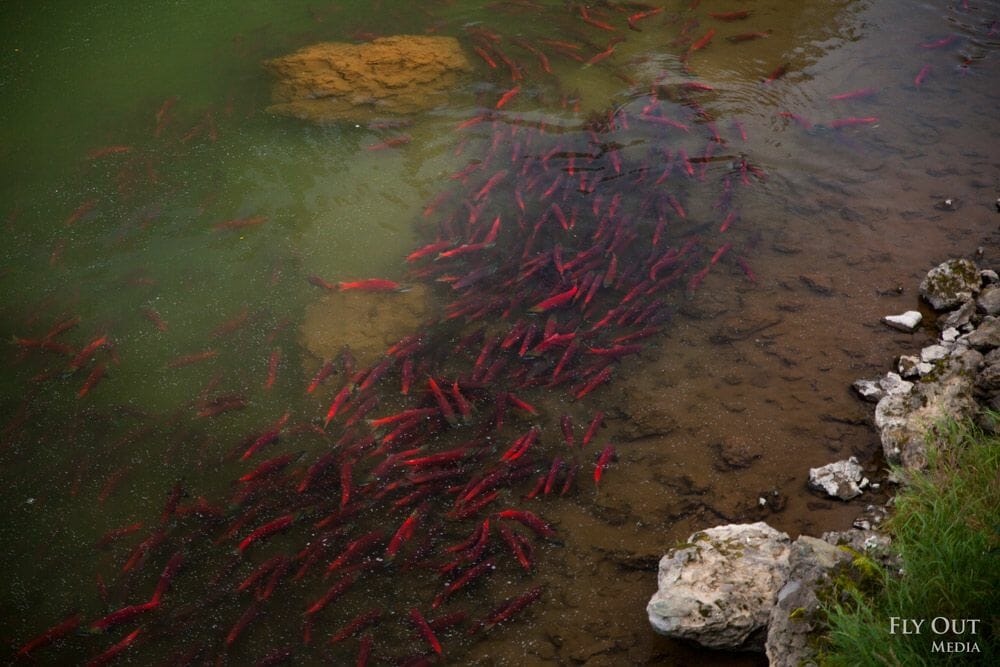This week, we moved a step closer to lasting protections for the Bristol Bay region and the most prolific sockeye salmon fishery on the planet.
The U.S. Environmental Protection Agency (EPA) announced that it would reinstate the 2014 “Proposed Determination” that would set limits on mine-related pollution in the Bristol Bay region. The move comes in the wake of a lawsuit brought by Trout Unlimited over a 2019 EPA decision under the previous administration to withdraw the proposed protections.
“A victory for common sense,” TU President and CEO Chris Wood called the announcement. “Blocking industrial-scale mining from Bristol Bay is the right thing to do for the Alaska native peoples who have depended on the fishery for millennia. It is the right thing to do for the 17,000 family wage jobs that the $1.6 billion commercial fishery provides. It is the right thing to do for a place that provides half of all of the world’s wild sockeye salmon.
“Congratulations to the EPA for making the right call and to the thousands of people who fought tirelessly to protect Bristol Bay.”
As wild salmon populations decline globally, Bristol Bay’s prolific wild salmon runs and the economies they support make it a place of international importance. This summer, over 65 million sockeye salmon returned to Bristol Bay, breaking the all-time run record for sockeye returns. Healthy salmon runs underpin the Bristol Bay region’s economic, social, cultural and ecological well-being. More than 30 Alaska Native Tribes in the region depend on salmon to support traditional subsistence ways of life.
TU looks forward to working with the EPA to finalize these protections, which are critical to protecting Bristol Bay’s world-class fisheries. Clean Water Act safeguards—paired with Congressional legislation—will offer durable protections that withstand shifting political winds in the future.
We encourage you to stand with TU, local communities, and business owners in calling for meaningful protections for this important place.
Clean Water Act 404(c) protections were first introduced in 2014 under the Obama administration, with significant input from local communities and watershed science experts. While the proposed protections would have restricted the discharge of mining waste into “Waters of the United States” in the Bristol Bay region, these protections were never finalized. In 2019, the Trump administration’s EPA withdrew the proposed protections for Bristol Bay. TU sued, citing clear violations of the Clean Water Act and Administrative Procedures Act.
The case got off to a rocky start. Not only did the EPA argue our case should be dismissed, but Alaska Gov. Mike Dunleavy and the state of Alaska intervened in the lawsuit in opposition to TU, choosing to side with the proposed Pebble Mine, rather than standing with Alaskans who sought to protect Bristol Bay and the thousands of American jobs it sustains. In April 2020, the court sided with the EPA, and dismissed TU’s case.
“Congratulations to the EPA for making the right call and to the thousands of people who fought tirelessly to protect Bristol Bay.”
Chris Wood, President and CEO, Trout Unlimited
Represented by D.C.-based law firm Sheppard, Mullin, Richter and Hampton LLP, TU appealed. After more than a year of review, the Ninth Circuit Court of Appeals sided with TU, setting the stage for this week’s announcement by the EPA that it will reinstate the proposed protections.
Today’s announcement is a major step toward establishing safeguards for the people, fish and fish-based industries in Bristol Bay. TU will work with EPA to make sure these Clean Water Act protections are finalized, but we also know that Congressional legislation is needed to ensure that Pebble—or any other mining company—does not return in the future with plans to operate in the Bristol Bay region.
“This is a smart and significant step toward putting more durable protections in place for Bristol Bay’s fish, clean water, communities and businesses,” said Nelli Williams, Alaska director for TU. “This is an important layer of protection that makes it much more difficult for the Pebble Partnership, or any other companies in the future, to mine the Pebble ore deposit. Now is the time to get these much-needed protections across the finish line, and we look forward to working with EPA and Congress to get it done.
“Let’s put the Pebble Mine proposal in the rearview mirror for good,” she added, “so we can focus on a bright, prosperous and fish-filled future for Bristol Bay.”
Read more in the Washington Post.



